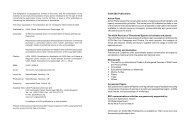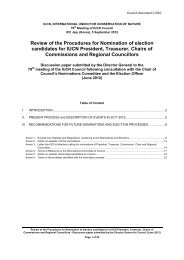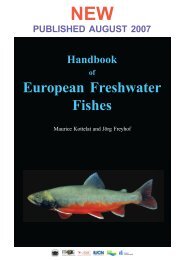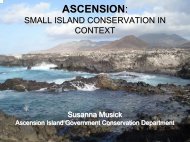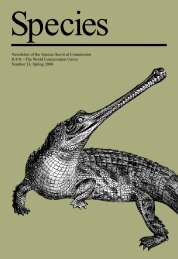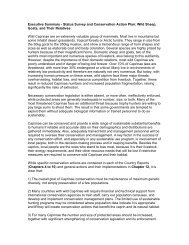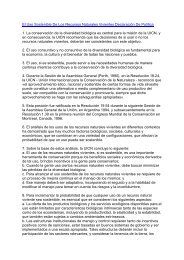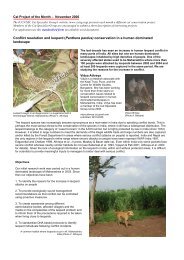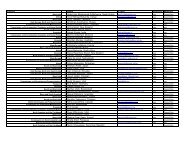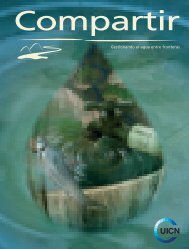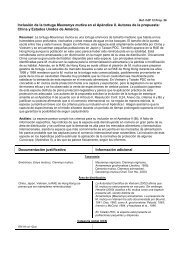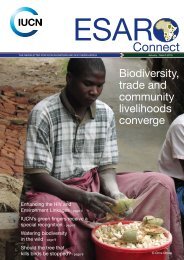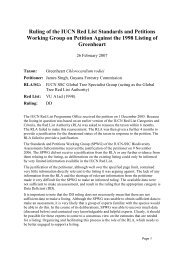Pllanning <strong>education</strong> <strong>to</strong> <strong>care</strong> <strong>for</strong> <strong>the</strong> <strong>earth</strong>Seabird conservation on <strong>the</strong> North Shore of <strong>the</strong>Gulf of St. Lawrence, Canada:The effects of <strong>education</strong> on attitudes and behaviour<strong>to</strong>wards a marine resourceKathleen A. BlanchardAbstractOn <strong>the</strong> North Shore of <strong>the</strong> Gulf of St. Lawrence, Quebec, Canada,seabirds traditionally have been harvested <strong>for</strong> food. Illegal huntingand disturbance of colonially-breeding seabirds caused severedeclines in <strong>the</strong> populations of several species between 1955 and 1978.A new management plan developed by <strong>the</strong> Quebec-LabradorFoundation in collaboration with <strong>the</strong> Canadian Wildlife Servicesought <strong>to</strong> res<strong>to</strong>re <strong>the</strong> depleted populations while preserving <strong>the</strong>integrity of <strong>the</strong> local culture. By 1988, three desired outcomes hadbeen achieved: an increased population of seabirds breeding insanctuaries; sustained improvement in local knowledge, attitudes andbehaviour <strong>to</strong>wards seabirds; and greater local support <strong>for</strong>, andinvolvement in, <strong>the</strong> management process. The programme includedyouth instruction, leadership training, in<strong>for</strong>mation dissemination andsupport building. The success of <strong>the</strong> programme demonstrates that<strong>education</strong>al strategies working within <strong>the</strong> cultural context can help <strong>to</strong>achieve resource management goals.IntroductionIn Caring <strong>for</strong> <strong>the</strong> Earth, <strong>IUCN</strong> - The World Conservation Union, <strong>the</strong> UnitedNations Environment Programme (UNEP) and <strong>the</strong> World Wide Fund ForNature (WWF), stated that environmental <strong>education</strong> and training can beimportant in effecting social change <strong>to</strong>wards a sustainable society(<strong>IUCN</strong>/UNEP/WWF 1991). In North America, <strong>the</strong>re are manyenvironmental <strong>education</strong> programmes that attempt <strong>to</strong> provide citizens with<strong>the</strong> appropriate values, knowledge, skills, and incentives, but many of <strong>the</strong>programmes fall short of influencing positive change in attitudes andbehaviour. Moreover, in resource management agencies, <strong>the</strong> traditional roleof <strong>education</strong> has been <strong>to</strong> provide in<strong>for</strong>mation that increases public awarenessand appreciation of natural resources. When perceived simply as a channel<strong>for</strong> in<strong>for</strong>mation, <strong>education</strong> often is given less importance than research,habitat management, and laws and en<strong>for</strong>cement, <strong>for</strong> conserving naturalresources. Agenda 21 states that <strong>the</strong>re is a larger, more important role <strong>for</strong><strong>education</strong> in helping societies change <strong>the</strong>ir behaviour <strong>to</strong>wards practices thatare consistent with sustainable living (United Nations 1993).39
<strong>Planning</strong> <strong>education</strong> <strong>to</strong> <strong>care</strong> <strong>for</strong> <strong>the</strong> <strong>earth</strong>Un<strong>for</strong>tunately, behavioural scientists question whe<strong>the</strong>r durable behaviourchange reliably follows from in<strong>for</strong>mation exchange; <strong>the</strong>re are fewdocumented cases where this has occurred (Festinger 1964, Geller et al.1982, Katzev and Johnson 1987). This is particularly relevant in wildlifemanagement, where agencies, in an ef<strong>for</strong>t <strong>to</strong> change attitudes or behaviour,have often used in<strong>for</strong>mation materials as a substitute <strong>for</strong> <strong>education</strong>programmes (Adams et al. 1988). Just because in<strong>for</strong>mation is printed in abrochure or displayed on a poster does not mean that <strong>the</strong> target audience willread, understand, and follow what is being asked, particularly if <strong>the</strong> messagegoes against traditions, local norms, or conflicts with personal ethics.Even when <strong>education</strong> <strong>to</strong> achieve a conservation goal is used successfully,seldom is its use <strong>care</strong>fully evaluated. In a recent report <strong>for</strong> <strong>the</strong> UnitedStates Fish and Wildlife Service, a conservation <strong>education</strong> expert reportedonly six examples from <strong>the</strong> North American wildlife and environmental<strong>education</strong> literature of <strong>education</strong> programmes in wildlife management tha<strong>the</strong>lped solve a resource management problem and that were evaluated. Thecase of seabird conservation on <strong>the</strong> North Shore of <strong>the</strong> Gulf of St.Lawrence, Canada, was one of <strong>the</strong>m (Pomerantz 1992). It demonstrates<strong>the</strong> effectiveness of <strong>education</strong>al strategies that work within <strong>the</strong> culturalcontext <strong>to</strong> help achieve resource management goals. It also suggests <strong>the</strong>efficacy of <strong>education</strong> and training as <strong>to</strong>ols <strong>for</strong> sustainability in rural areas(Blanchard 1991). The programme has proved successful in helping <strong>to</strong>reverse population declines in nesting seabirds and in contributing <strong>to</strong>improvements in <strong>the</strong> knowledge, attitudes and hunting behaviours ofresidents.The issueIllegal hunting and disturbance of seabirds in sanctuaries on <strong>the</strong> North Shoreof <strong>the</strong> Gulf of St. Lawrence led <strong>to</strong> dramatic population declines <strong>for</strong> severalspecies between 1955 and 1978. The populations of Razorbill (Alca <strong>to</strong>rda)and Atlantic Puffin (Fratercula arctica) were reduced by 84 and 76 percentrespectively. The Common Eider (Somateria molissima), Common Murre(Uria aalge) and Black Guillemot (Cepphus grylle) were also severelyaffected.The section of <strong>the</strong> Quebec coast known as <strong>the</strong> Lower North Shore, whereillegal harvesting was most severe, has some 400 km. of rugged coastline, iswithout road links <strong>to</strong> <strong>the</strong> outside world, and has a population of 5,600 mostlyEnglish-speaking residents in 15 fishing communities. Seabirds aretraditionally harvested <strong>for</strong> food. An en<strong>for</strong>cement programme introduced by<strong>the</strong> Canadian Wildlife Service (CWS), backed by <strong>the</strong> provincial wildlifeagency and <strong>the</strong> Royal Canadian Mounted Police, had been insufficient inreducing <strong>the</strong> level of illegal seabird hunting.In 1978, <strong>the</strong> non-profit Quebec-Labrador Foundation (QLF), in consultationwith local residents and in collaboration with CWS, developed a newmanagement plan <strong>to</strong> res<strong>to</strong>re depleted seabird populations in this region whilepreserving <strong>the</strong> integrity of <strong>the</strong> local culture. The programme had four major40



